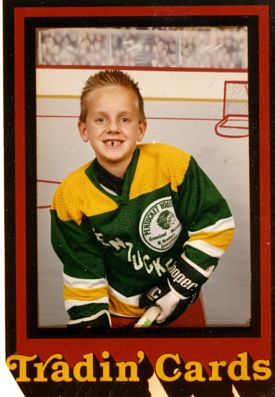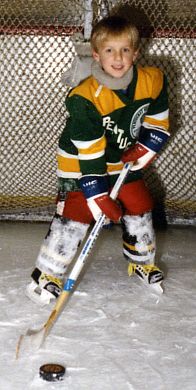Part I: Beginnings
November 21, 2003
My wife and I walked into the Salem State rink over an hour before the game. For over a week, our first words every morning had been “Nine days,” and then “Eight days” and then “Seven more.”
The big day, our son Ryan’s first collegiate game, was here. He’d been a small kid with big dreams and this night was the fulfillment of those dreams, the payoff for getting up as early as four in the morning for practices or long-distance travel to games, the payoff for doing all the extra powerskating sessions, the payoff for enduring some losing seasons to learn from a coach who could teach Ryan the most about a sport he loved. My wife and I didn’t intend to miss a minute of even the warm-ups.
I must plead guilty to being very emotional about my family. They are my life. And so as Ryan stood there on the blue line for the national anthem, my eyes welled with tears of pride and happiness.
He’d done it.
The little tyke who so many years ago had prompted a befuddled mother to ask, “Why is he always falling down?” was now living his dream. Others who had once skated circles around him had fallen by the wayside.
The story wouldn’t end there either. Three years later, he would skate with a co-captain’s C on his jersey, an honor not lightly bestowed, and help lead his team to arguably the best season in the school’s history. At Wesleyan University, considered one of the “Little Ivies,” he would earn NESCAC All-Academic honors and by October of his senior year he would have an exceptional job already lined up for after graduation.
How did the dream become reality? What were the keys to his development? How did he deal with prep school choices and recruiting for college?
This account is the answer to those questions. It may be read as a memoir filled with amusing stories — at least I hope you find them amusing — or as a series of suggestions on how to achieve the dream of collegiate hockey or as simply a tale of a proud father’s love for his son.
I hope you enjoy Hendu’s Story.
A few days after my wife and I had explained the “facts of life” to Ryan, I was driving him to the rink.
“You know that conversation Mom and I had with you?” I asked. “About boys and girls and where babies come from?”
“Yeah.”
“We really meant it about you coming to us with any questions you have,” I said. “Anything at all. Just ask.”
Ryan nodded. “Okay.”
He didn’t say anything for a while, but then a very puzzled look came over his face. “Dad?”
This, clearly, would be The Big One, a question that I’d better not fumble. My mind raced ahead to what might be puzzling Ryan and how I’d best explain it. I hoped I was up to the challenge.
“Yeah?” I said.
Ryan waited a second before hitting me with The Big One. “Who do you think is better, Sergei Fedorov or Pavel Bure?”
Ryan had a chronic case of Hockey On The Brain. It had been that way since he was three years old and had sat down to a Bruins game that was on the TV and hadn’t gotten up until the game was over. Within a week, a new ritual had begun in the car. I would give the first name of a Bruins player and he would give the last.

“Ray,” I would say.
“Bourque,” Ryan would answer.
“Cam.”
“Neely”
“Bruce.”
“Shoebottom.”
“Reggie.”
“Lemelin.”
And so it went. Bourque and Neely were favorites for all the obvious reasons, but after attending a few games Shoebottom and Lemelin were added to the list.
Shoebottom, a journeyman defenseman, had a memorable last name that became Hall-of-Fame material after he scored an improbable goal and a fan next to us, perhaps a bit over-lubricated, threw his sneaker onto the ice in tribute. Ryan thought it hilarious, as did I, and so Shoebottom rose on both our lists out of all proportion to his abilities. I always wondered how that fan explained his missing sneaker when he got home.
Lemelin, the goaltender who had a couple great seasons with the Bruins near the end of his career, was another favorite. In one game we attended, he stood on his head to preserve a win and the chants rang out of “Reggie! Reggie! Reggie!”
Ryan, whose middle name is David, had equated “David” with “Daddy” in his preschooler’s mind and had taken to calling himself Ryan Daddy David Hendrickson. But after the Bruins game involving Lemelin’s heroics, Ryan asked me to take shots on him as he guarded a makeshift net with a plastic street hockey goalie’s stick and a baseball catcher’s mitt. In this goaltending persona, he adopted the name Reggie and now became Reggie Ryan Daddy David Hendrickson.
He didn’t just make the saves. Reggie Ryan Daddy David Hendrickson also delivered the play-by-play. When the tennis ball nestled into his glove, he would say, “Glove save!” Then when he stopped it with his stick, it would be, “Stick save!” When I accidentally hit him between the legs, he announced, “Pee-pee save!”
Ryan couldn’t get enough of sports in general. Keeping up with him could be exhausting. He was like the Energizer bunny.
As soon as I’d get home from work, he’d be asking, “Dad, let’s go outside and play catch.” Sometimes it would be football, other times it would be baseball. Occasionally, he would coax my wife Brenda and daughter Nicole out for a two-on-two football game, but Nicole was an excellent competitive swimmer who didn’t have much time for other sports. As a result, it mostly was games of catch between the two of us.
But it wasn’t enough just to play catch. “Make me dive!” was Ryan’s constant command. My best throws were those that forced him to catch the ball, whether football or baseball, parallel to the ground. If his clothes weren’t covered with dirt and grass stains by the time we called it quits, I’d been guilty of horrible aim.
Calling it quits could be a problem. If dinner wasn’t ready, it didn’t matter to Ryan that darkness or mosquitoes had descended. Perhaps the mosquitoes couldn’t catch up to him, but they found my stationary form an inviting target. I’d only be able to convince Ryan to go inside by counting down.
“The mosquitoes are devouring me,” I’d finally say as I swatted at my legs and arms. “Twenty more and that’s it.”
Ryan would reluctantly agree, but often the countdown got stuck at one.
“Just one more, Dad. C’mon. Just one more,” he’d say.
How could I turn him down?
“Okay, but this is really the last one.”
However, then I’d throw one that he only had to half-dive for, and what kind of a way was that to finish? Ryan would frequently weasel five or six extra throws out of me, keeping the neighborhood mosquitoes well-fed in the process, until I finally made the perfect throw that resulted in the perfect diving catch.
Then we’d go inside and down into the basement where I’d take shots with a tennis ball on “Reggie Ryan Daddy David Hendrickson” and he’d take shots on me. Once he was past his youngest years, we’d then put the shot tutor on the goal as Ryan shot with real pucks.
I’d pick which of the five holes to shoot for, “Blocker side, low” or “Glove side, high,” going from wrist shots to backhanders to slap shots. Sometimes, I’d line up five pucks in a row with the idea of him learning a quick release.
This would go until dinner and then often resume afterward. It was difficult to keep up with his boundless energy.
Of all the sports, Ryan loved hockey the most. Nothing else came close. Ironically, he showed the most natural ability at those sports that emphasized hand-to-eye coordination. He was a natural at racquetball, tennis, baseball and golf.

In hockey, however, he was always falling down. Years later, a podiatrist would look at his feet and ask, “How the (bleep) can you skate?”
Despite custom orthotics, without which it was impossible for Ryan to stand up in skates at all, it still took a while for him to overcome this disadvantage. He would eventually become a strong skater, but it was no coincidence that all his early pictures from youth hockey showed his stockings coated with ice shavings.
Still, he kept at it. Not because my wife or I told him to, but because he loved what he was doing. His town hockey team offered optional powerskating sessions every Saturday morning during the season at six a.m. Ryan never considered those sessions optional.
We also found powerskating sessions run by other organizations that ran midweek and on Sunday afternoons and evenings. We’d go to a couple of those each week, too.
Perhaps just as important, Ryan would do many of these awkward-looking drills just as he was instructed to. While many kids cut corners so that they could finish first, Ryan performed the drill precisely as specified, no matter how awkward. It was no coincidence then that he got the most out of those sessions. The kid who had always been falling down became a stronger and stronger skater.
After hearing about these extra skating sessions, one parent said to me with what amounted to a sneer, “What do you think, he’s going to play for the Bruins some day?”
I was stunned then, as I remain to this day, at the utter stupidity of the comment. If a kid is motivated and doing something he loves, why wouldn’t a parent help him become as good as he can be?
Striving for excellence is a pursuit that has its own intrinsic payoff, arguably one which translates to “the real world” in life-changing ways. And playing professional hockey isn’t the only possible goal for a hockey player.
For Ryan, the immediate payoff was getting better at something he loved. The ultimate payoff would be a great education. Wesleyan University is one of the most selective schools, accepting only one out of every four applicants. Being an excellent student isn’t enough. You need something to be a difference-maker, something that separates you from the pack of other excellent students. In Ryan’s case, that was hockey.
But even if there hadn’t been that payoff, isn’t helping a kid be the best that he can be a sufficiently worthy result?
This series continues with youth hockey in Part II.


